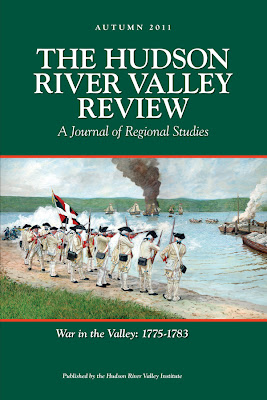 As Associate Editor of The Hudson River Valley Review, published by The Hudson River Valley Institute (HRVI), I get to explore the region that I call home and to share these finds with our readers. While our website allows us to be as expansive as our associates and interns are interested in being, it is the journal that I find most rewarding with its approximately 150 pages per issue that forces us to focus our interests and energies into a concise product every six months. The Hudson River Valley Review is published each spring and autumn, alternating between thematic and open issues.
As Associate Editor of The Hudson River Valley Review, published by The Hudson River Valley Institute (HRVI), I get to explore the region that I call home and to share these finds with our readers. While our website allows us to be as expansive as our associates and interns are interested in being, it is the journal that I find most rewarding with its approximately 150 pages per issue that forces us to focus our interests and energies into a concise product every six months. The Hudson River Valley Review is published each spring and autumn, alternating between thematic and open issues.
Founded in 1984 at Bard College as The Hudson Valley Regional Review, it almost went out of print in 2001. HRVI negotiated to assume publication in 2002. We changed the name and added a number of features, but it continues in the spirit that it was founded. In addition to a wide variety of topics covered in the open issues, we have produced journals covering the American Revolution, the Civil War, Landscape Architecture, the recent Hudson-Fulton-Champlain Quadricentennial Celebration, and innovation and commerce. We have also worked with guest-editors to produce issues dedicated to the writings of Edith Wharton and John Burroughs as well as to the legacy of Eleanor Roosevelt.
While the thematic issues stand well as overviews of certain aspects of the region, it is often more fun to assemble the open issues, comprised of those submitted articles that pass peer review on any variety of topics in a range of disciplines. Our Spring 2006 issue included articles that discussed the seventeenth-century Leislerian Rebellion, the nineteenth-century voyage of a Dutch visitor from Brooklyn to the Catskill Mountain House (including a portion of his translated journal), and the Twentieth-Century creation of Black Rock Forest as an educational preserve.
Whenever a new issue is released, we place a PDF of the introduction, History Forums, New and Noteworthy books, and full reviews on our website. We do not post the main articles until the issue goes out of print.
You can find a list of the last ten years of back issues online at: http://www.hudsonrivervalley.org/review/back_issues.html.
We have an online index of articles going back to 1984 which we update with every new issue that comes out as well: http://www.hudsonrivervalley.org/review/indices.html.
We also received copies of most of The Hudson Valley Regional Review when we took over publication, and have many of those as well as our own back-issues still available. There is a list of out-of-print issues on our subscription page: http://www.hudsonrivervalley.org/review/subscribe.html.
Chris Pryslopski is Program Director of Marist College’s Hudson River Valley Institute and Associate Editor of the Hudson River Valley Review.